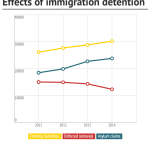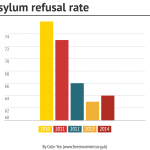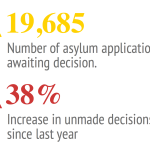- BY Colin Yeo

Damning deportation report
THANKS FOR READING
Older content is locked

A great deal of time and effort goes into producing the information on Free Movement, become a member of Free Movement to get unlimited access to all articles, and much, much more
TAKE FREE MOVEMENT FURTHER
By becoming a member of Free Movement, you not only support the hard-work that goes into maintaining the website, but get access to premium features;
- Single login for personal use
- FREE downloads of Free Movement ebooks
- Access to all Free Movement blog content
- Access to all our online training materials
- Access to our busy forums
- Downloadable CPD certificates
The National Audit Office has published a damning report on the UK’s deportation process today. The numbers of foreign criminals deported have actually declined since 2008-09 despite a tenfold increase in the number of staff dealing with these cases at the Home Office, from below 100 in 2006 to over 900 in 2013-14. What are they doing, one has to ask oneself? It was apparently only in 2012 that the Government started to take preventative measures to prevent foreign criminals entering the UK. Even today the UK remains outside critical European government intelligence networks.
The report follows a similar damning indictment in March 2014 of management of detention and deportation at the Home Office by the Chief Inspector of Borders and Immigration, John Vine (“Removals process revealed to be a shambles“). All the indications are there is some very serious mismanagement going on at the Home Office. That certainly matches with my own experiences: months at a time go by before anyone at the Home Office takes any action on a case and immigration bail is eventually granted to foreign criminals who cannot lawfully be detained any longer.
One of these reports might be dismissed as unfortunate, but two looks pretty careless. Amongst other things the Chief Inspector found that
- 78% of those in the inspection sample who were in contact with the Home Office were not being actively caseworked. 15% of the sample had been granted some form of residency or leave to remain, so should not have remained in the pool.
- The Home Office was applying for too many ETDs [Emergency Travel Documents] that had little prospect of being used, rather than focusing resources on cases where re-documentation was likely to result in removal.
- There was no central monitoring of the progress of the stock of approximately 4,000 outstanding ETD applications that the Home Office manages at any given time, which had led to some applications remaining unresolved for long periods
- Supporting information that could assist in securing an ETD was not retained on a systematic basis as part of the visa application process
- Management information on aspects of the ETD process was inadequate and did not give an accurate picture of performance, including information on how many currently removable cases would need an ETD to be concluded.
The NAO report includes a few wince-inducing bloopers which read like press release material from the Home Office itself. The reduction in appeal rights for foreign criminals facing deportation from 17 to 3 really doesn’t matter when the only appeal right that normally counts is the human rights one, and that remains in place. The important change wrought by the Immigration Act 2014 is actually that most foreign criminals will be removed while waiting for their appeal and only re-admitted if they later win it (which is inherently less likely as they will not be present to gather or give evidence).
And no lawyer can be happy with a reference to people “exploiting” the law, when in fact 1 in 7 win their cases. “Make use of their legal rights” might be a rather more accurate way to express it.
Operation Nexus is being held out as an example of best practice, but there are very strong community concerns that the association of police with immigration enforcement reduces access to justice for migrant communities.
Cameron says “the buck stops with me” but after four years the Government is detaining more people, detaining them for longer and removing less of them. The amount paid out for unlawful detention increased from £4,461,344.28 in 2011 to £5,017,971.63 by 2013, a 12.5% increase. I have written on a similar issue before but about asylum claims (NOT to be confused with foreign criminals – my comparison here is with use of detention, drop in removals, increase in backlog). The Government is failing in every conceivable way on these issues.



SHARE

